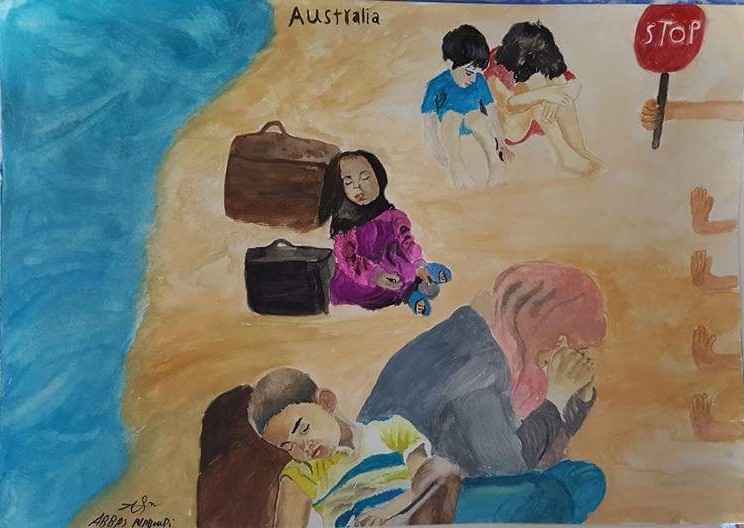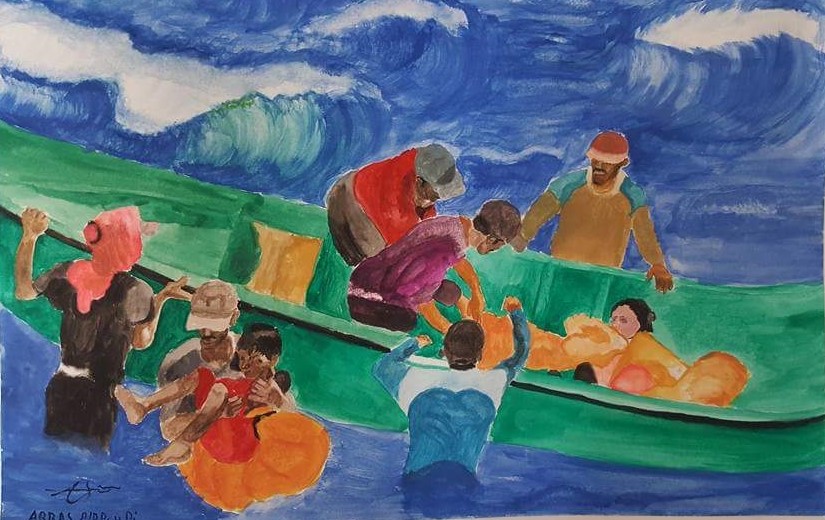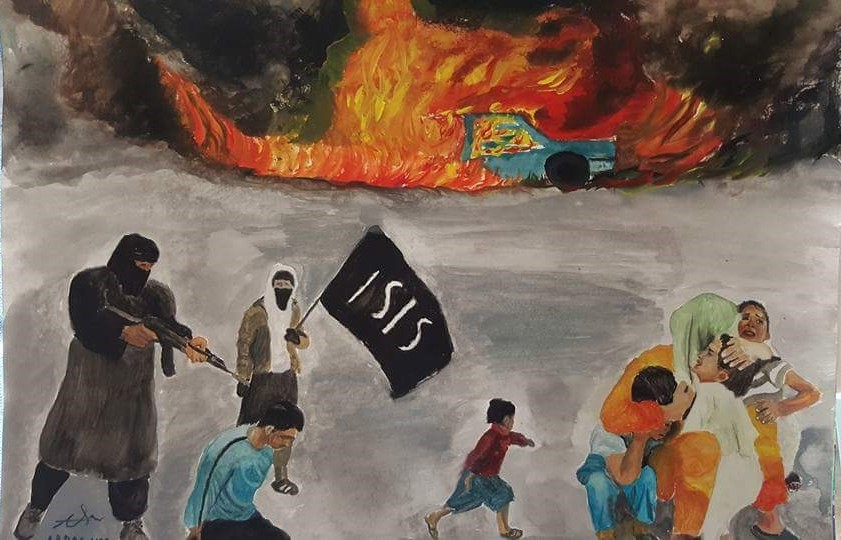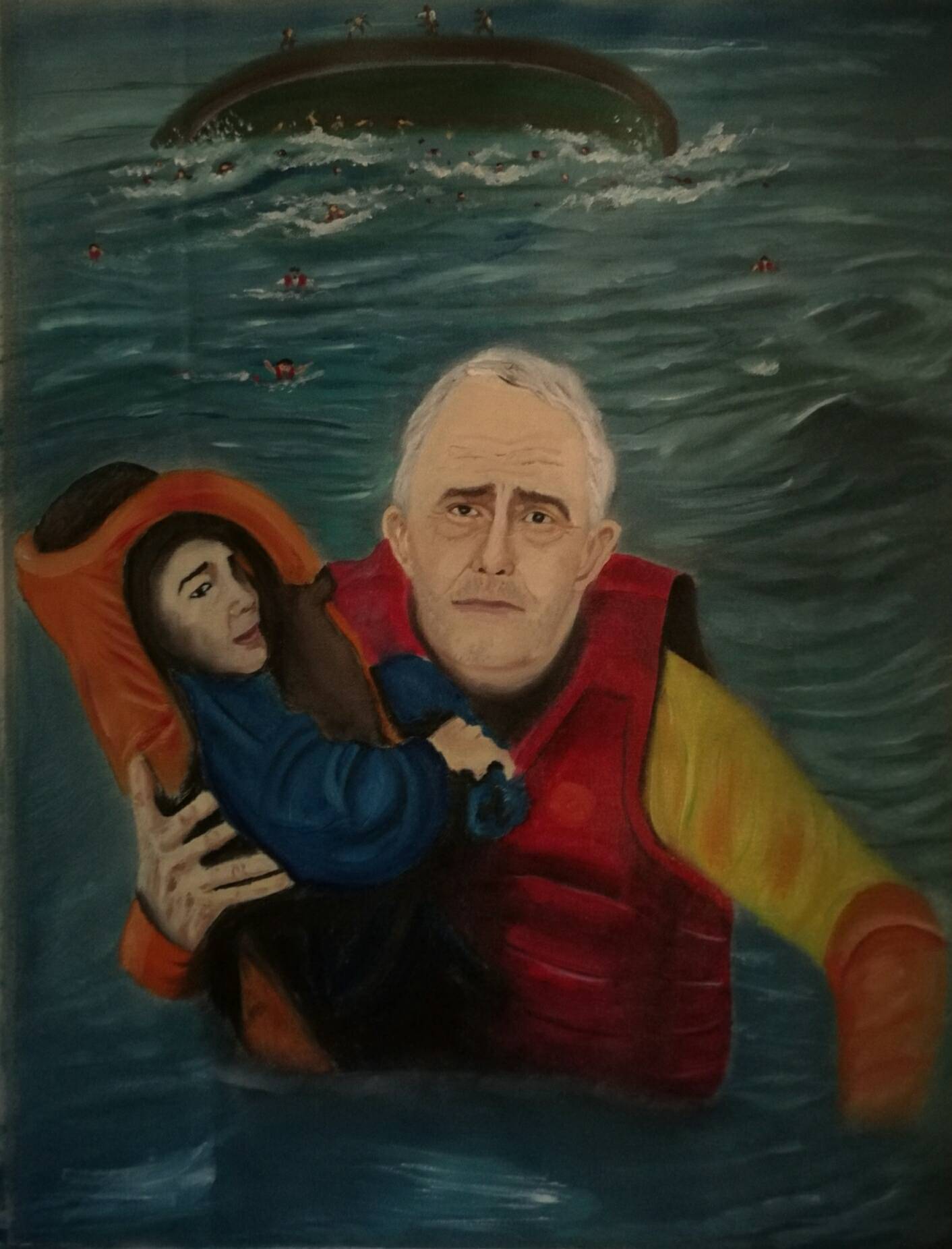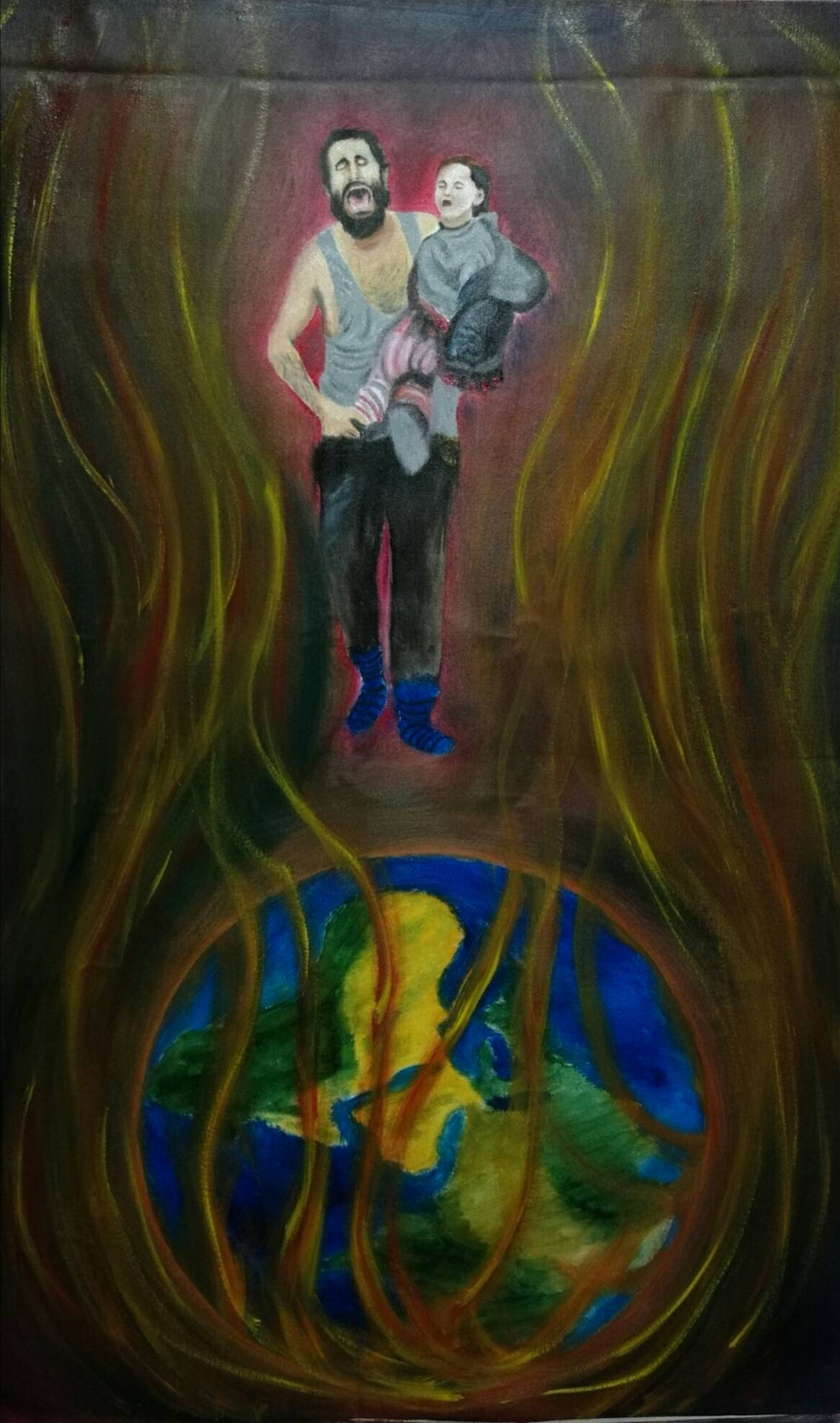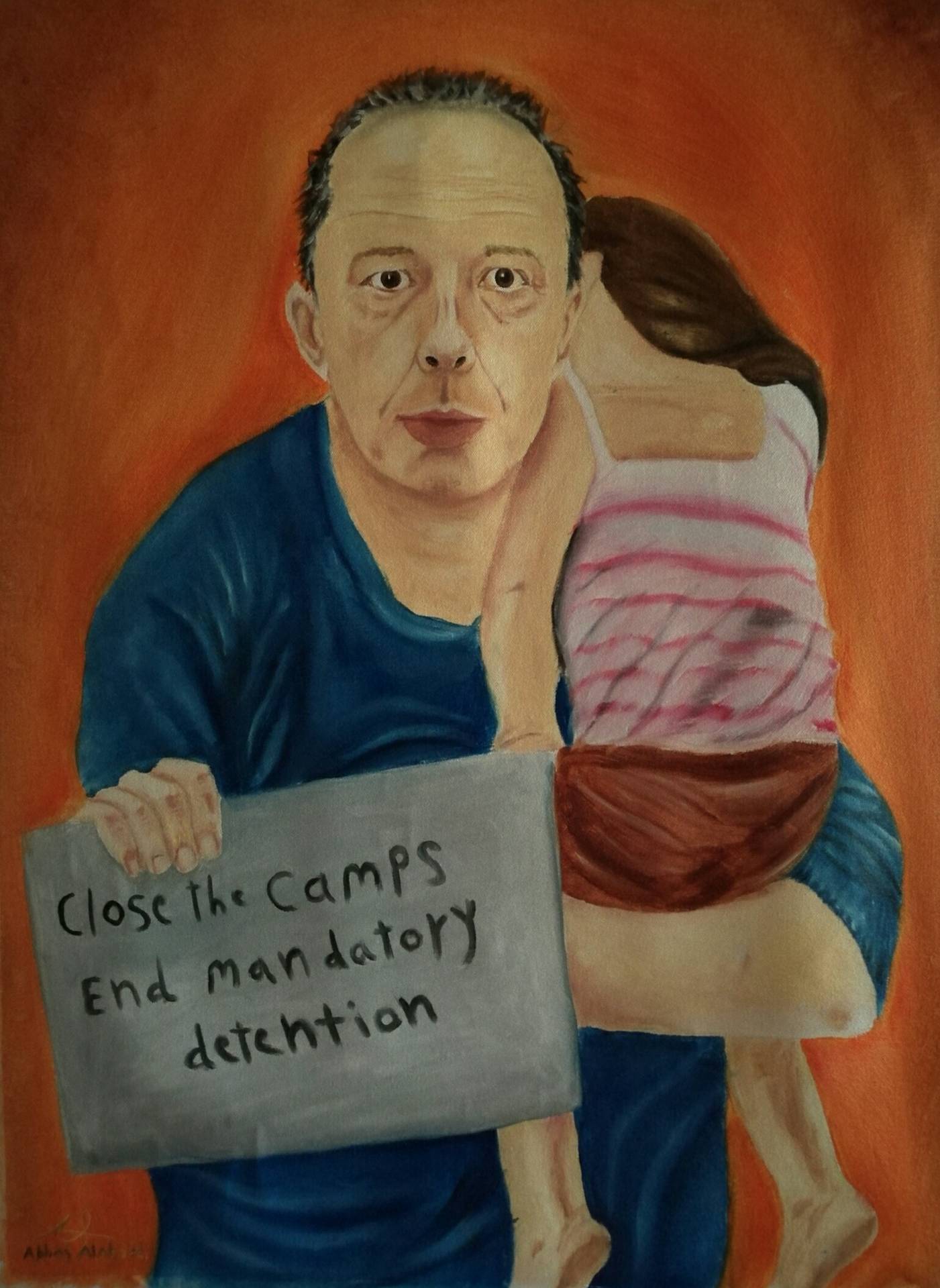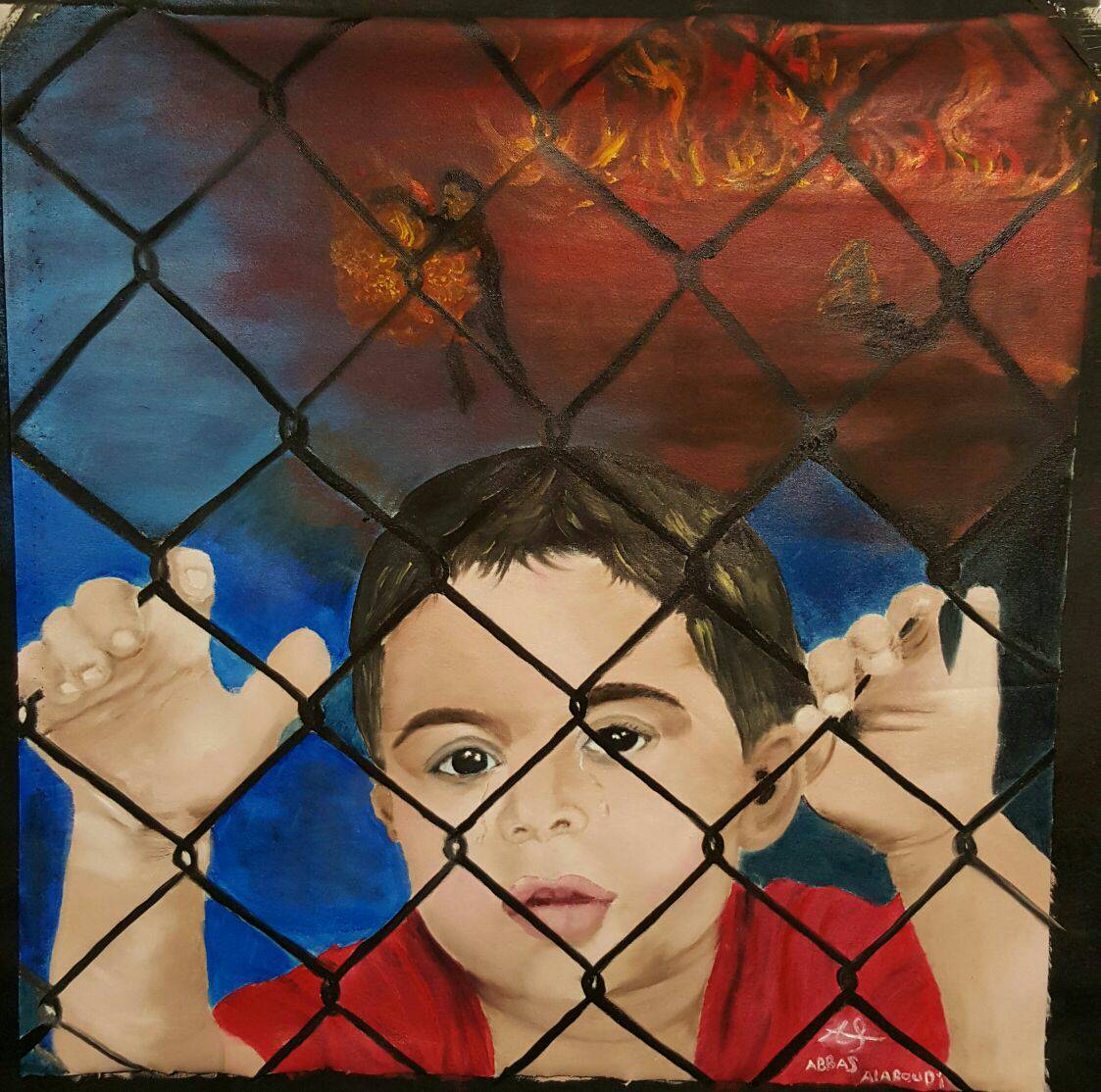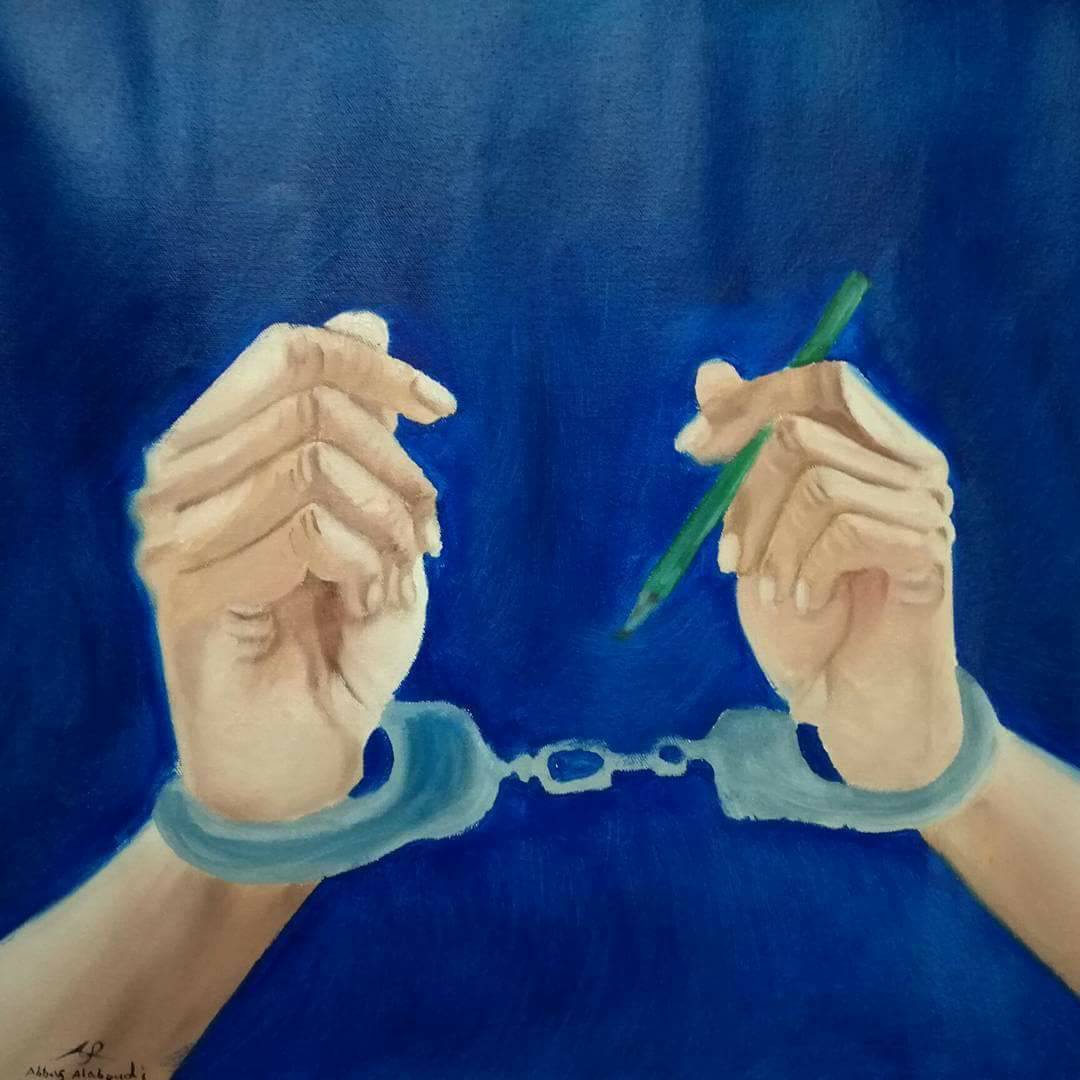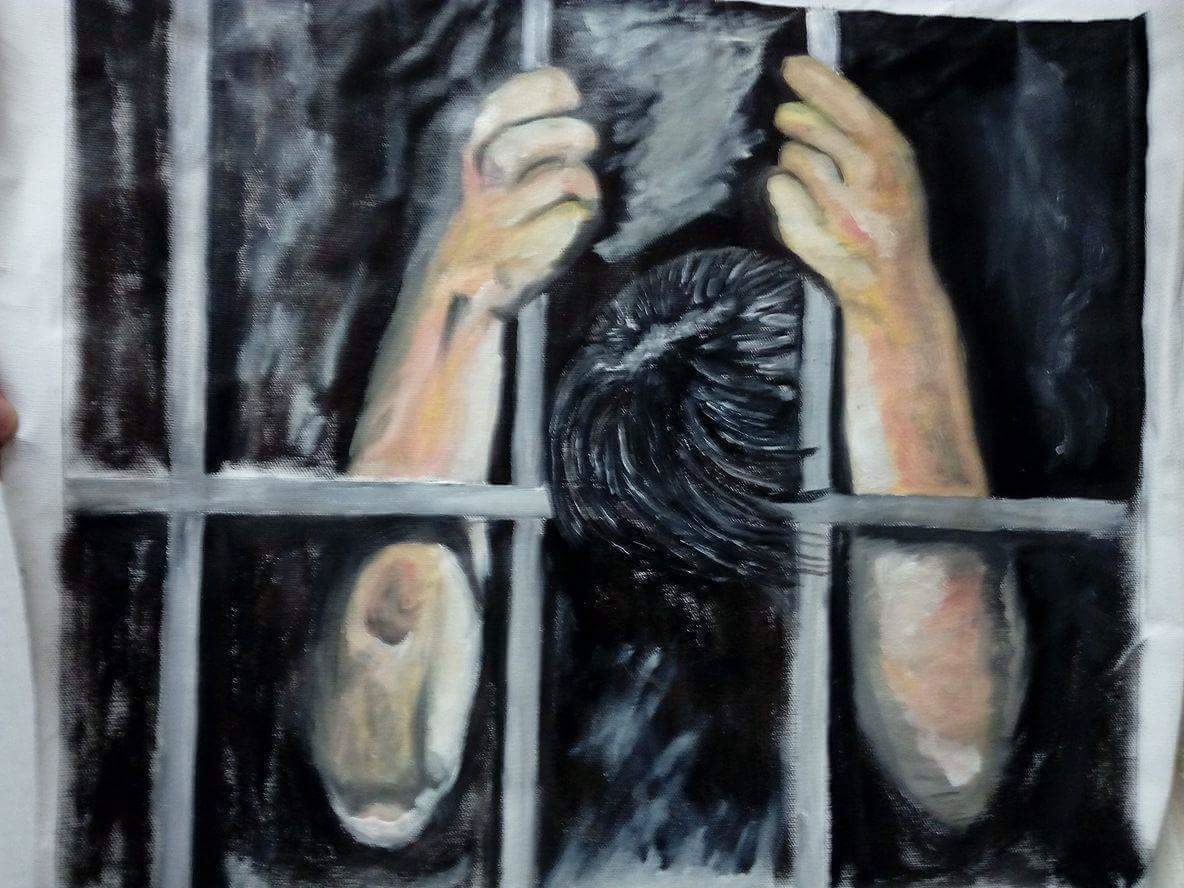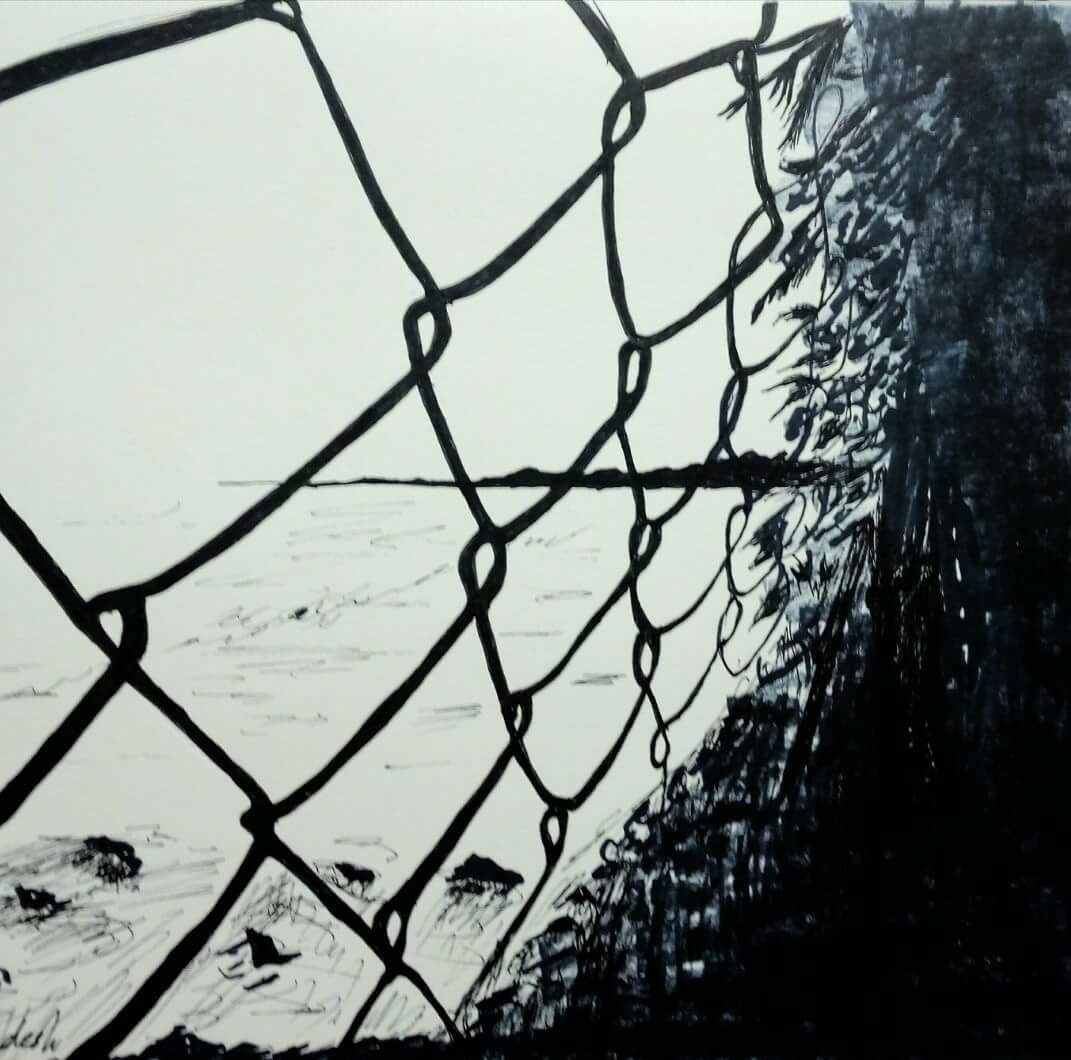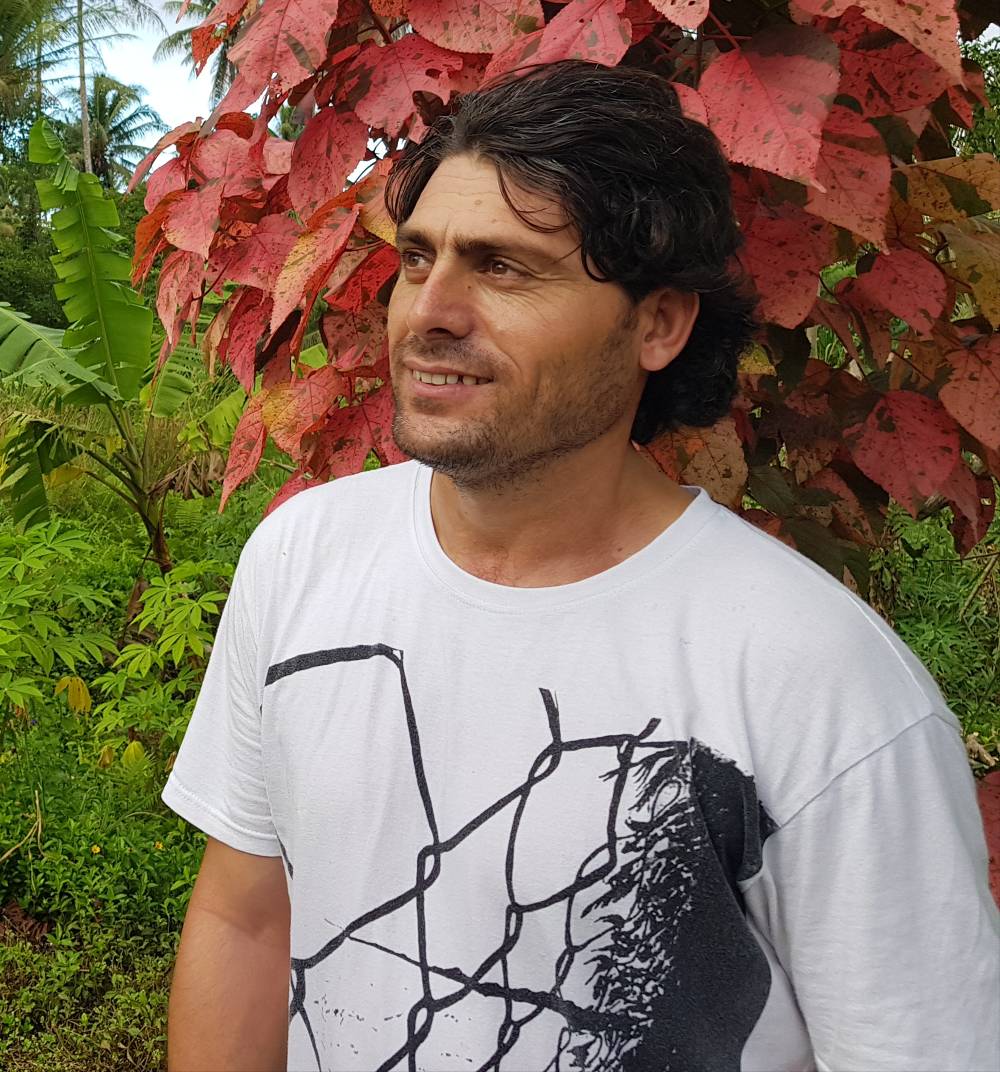Image by Farhad Bandesh.
The following artworks, writing, poetry and music come from four asylum seekers—Mustafa, Abbas, Farhad, and Behrouz—who have been detained for the past five years by the Australian Government on Manus Island and Nauru. Hundreds of refugees have been detained illegally and inhumanely in prison-like detention centres on these two islands. This piece provides a small window into some of the journeys, voices, and feelings of those detained.
Chanting of Crickets, Ceremonies of Cruelty: A Mythic Topography of Manus Prison
by Behrouz Boochani
This is an excerpt from Behrouz Boochani’s book, ‘No Friend But the Mountains: Writing From Manus Prison’, translated by Omid Tofighian and published by Picador in 2018. This chapter was also published in Island Magazine 150.
The human being is born enduring affliction.
The human being lives while enduring affliction.
The human being dies by enduring affliction.
The human being realises affliction.
The human being is cognisant of whatever
pertains to affliction.
Lamentation
Crying out
Wailing
Weeping.
The human being experiences all of these things.
The human being has deep knowledge of all of
these things.
That night. The one night that I’m talking about is the
night when I was having convulsions as a result of toothache.
And I bashed my head a number of times against
the metal container holding the bathrooms.
I could hear a faint moaning sound.
The intensity and fear resonating in the sound completely
stopped me in my tracks. It was the sound of
painful moaning. It was the sound of a man that seemed
to be convulsing in pain. These particular kinds of
sounds make one’s hair stand on end.
The sound of the deepest kind of affliction.
The sound of hopelessness. A nightmare about
the nights. A nightmare about loneliness.
The sound of moaning inside the cauldron of the
dark night.
The sound of moaning floating over the ocean.
The sound of moaning wading through the
jungle that lay beyond the fences.
The sound of moaning dragged itself along in
combination with other sounds.
The sound of moaning, like a poisonous arrow
from the archer’s bow.
The sound of moaning, a sound without rebound
against the darkness of night.
The sound of moaning, then it disappeared out
into the universe.
The prison had fallen into a heavy silence; the
prison had fallen into heavy sleep. Only the
sound of crickets; they hollowed out the depths
of silence even further. The very great weight
of the silence had infused the moaning with a
destructive power.
My god, prison is so horrific. Prison is so
oppressive. Prison is so merciless.
The moaning could’ve even been the sound of clouds tearing apart – this was the way it felt to me. Exactly like the intensity of wrath and power manifested by thunder and lightning strikes in springtime. Perhaps deep wounds and scars struck down from the clouds and heavens with higher voltage than thunder and lightning. The coconut trees, however, offered their hair up to the zephyr. They were quivering, they were also frightened.
A Papu rested his back against one of the containers, his cap on his lap, twirling a stick in his mouth. I think he was at the peak of getting high off betel nut; his mind was free and he closed his eyes without a care for anything going on around him. This experience was a mix of slumber, wakefulness and a drug-induced state; however, it was a special moment of liberation unique to the Papus. The Papu paid no attention whatsoever to the moaning that spiralled out through the atmosphere. He had completely dedicated his mind and body to his betel nut intoxication.
And so the moaning continued. But on every occasion it hid deep within the heart of the dark sky with another kind of shudder and force. Every instance of moaning, more than anything, evoked the eerie sublimity of the jungle, the ocean, and the prison.
My toothache began to settle. Perhaps when the forces of two forms of affliction, from two separate origins, collide, one has to succumb due to the impact and resistance. Maybe something like this had occurred for me. My toothache was directly connected to interweaving nerves deep within the core of my gums. And my affliction was facing off with the affliction of another just a few metres away – behind the fences – it sounded like hopelessness – the sound emitted from a place of profound hopelessness – my toothache was forced to withdraw. Maybe we shared the same feeling of affliction; one and the same substance: the affliction at the root of the moaning, the affliction down there in the depths of my soul.
Behrouz Boochani graduated from Tarbiat Moallem University and Tarbiat Modares University, both in Tehran; he holds a Masters degree in political science, political geography and geopolitics. He is a Kurdish-Iranian writer, journalist, scholar, cultural advocate and filmmaker. Boochani was writer for the Kurdish language magazine Werya; is Honorary Member of PEN International; winner of an Amnesty International Australia 2017 Media Award, the Diaspora Symposium Social Justice Award, the Liberty Victoria 2018 Empty Chair Award, and the Anna Politkovskaya Award for journalism; and he is non-resident Visiting Scholar at the Sydney Asia Pacific Migration Centre (SAPMiC), University of Sydney. He publishes regularly with The Guardian, and his writing also features in The Saturday Paper, Huffington Post, New Matilda, The Financial Times and The Sydney Morning Herald. Boochani is co-director (with Arash Kamali Sarvestani) of the 2017 feature-length film Chauka, Please Tell Us the Time; collaborator on Nazanin Sahamizadeh’s play Manus; and author of No Friend but the Mountains: Writing from Manus Prison (Picador 2018).
Artwork
by Abbas Alaboudi
My name is Abbas Alaboudi, I am 28 years old. I am from Iraq. I have been 5 years on Nauru. I painted these paintings in Nauru. The situation on Nauru is very hard to describe by painting, but at least by painting I could express my feelings. “I am sorry I cant add anything else I reached to situation so so bad and I can’t talk about anything else.”
Poetry
by Mustafa Aziz
I want you to hug me when I get scared
I want you to kiss me when I act like a kid
I want you to care for me when I’m sick
I want you to listen to me when I wanna say something
I want you to understand my silence when I don’t have words to express what I feel
I want you to be there when I need a friend
I want you to love me for what I am and above all
I want you to complete me
My name is Mustafa Aziz. I am 29 years old, from Sudan. I have been on Manus for five years. I was in East Lorengau center on Manus when I wrote this poem.
Poetry and Artwork
by Farhad Bandesh
Flee from war to find peace
Warfare made to kill innocent people
To feel calm is my dream
To get world peace is your dream
We are tormented by our dreams
Human rights are our right
No more tears no more wars
No more genocide no more bloodshed
Rise up people you are me, I am you
intertwined united
Freedom’s cessation hope obliterated
eliminate the borders barbaric policies
lives repeatedly decimated
The webbed army of arbitrary
Universally declared but not for us
Human rights are our rights
I am a Kurdish artist – a refugee imprisoned by the Australian Government on a remote island filled with pain and suffering. This is my life now for 5 years. My art includes paintings, working with stones and gems, drawing and graphic art. I am also a musician, guitar maker, singer and poet. Throughout these years of torture and suffering I write poetry, paint, and write music and songs. It is something I need to do. I use art to reach people and make sure you know we are still here indefinitely Imprisoned and tortured. They use our bodies to make profit from human misery, to warn others not to seek safety and protection from Australia, to use us as political pawns. My song Flee From War I did inside the prison refugee camp. It is about human rights. It is about who has the power and kills innocent people. Here is a link to the song. When I hear or see this happening I feel really heartbroken and I thought I had to do a song about this. We ask for humanity, for human rights, for decency and kindness to people fleeing war, torture and horrific situations. Thank you so much for engaging with my art and for supporting the rights of people who seek safety and freedom.
Yours sincerely – Farhad Bandesh
Facebook page: Farhad Bandesh Art


